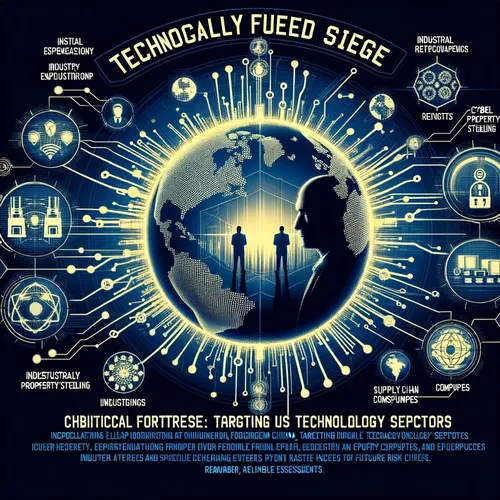Silicon Siege: China's Hacking Bonanza Strikes US Nukes, Missiles & More!
- Author
- Quiet. Please
- Published
- Wed 23 Jul 2025
- Episode Link
- https://www.spreaker.com/episode/silicon-siege-china-s-hacking-bonanza-strikes-us-nukes-missiles-more--67089635
This is your Silicon Siege: China's Tech Offensive podcast.
Buckling up, because the past two weeks in US tech and cyber have felt less like Silicon Valley and a lot more like Silicon Siege. I’m Ting, and today’s main event: China’s tech offensive—starring fresh hacks, purloined blueprints, and a Microsoft-fueled thriller that has agencies and engineers sweating like an unpatched server in July.
First up, the headline nobody wanted: Microsoft disclosed that not one, not two, but three Chinese government-backed hacking groups—Linen Typhoon, Violet Typhoon, and the charmingly named Storm-2603—took turns exploiting critical zero-day vulnerabilities in on-premises SharePoint systems. What’s SharePoint? Only the digital filing cabinet for some of the world’s most sensitive files, used across US government agencies including the one that designs our nuclear weapons. Bloomberg and Microsoft themselves confirmed the breach at the National Nuclear Security Administration. So, you know, just your average Tuesday in cyberwarfare.
These exploits let hackers bypass authentication, impersonate legitimate users, and lace legitimate-looking data exchanges with malicious code. According to Charles Carmakal, CTO over at Mandiant, both US federal and state agencies, along with global critical infrastructure and healthcare orgs, were hit. Even after Microsoft dropped a patch, attackers found workarounds—think zombie vulnerabilities that just would not die. Microsoft quickly issued secondary fixes, but here’s the kicker: even patched servers need users to refresh cryptographic keys, or attackers could just stroll back in. And yet, about 20 percent of exposed systems are still unpatched. Let that sink in.
Meanwhile, if you thought traditional industrial espionage was old-fashioned—surprise! US Department of Justice documents revealed that Chenguang Gong, a dual US-Chinese citizen and engineer, confessed to swiping over 3,600 classified files from a California defense tech firm, all tied to missile detection and infrared sensor systems. We’re talking blueprints for tech that spots nuclear launches and helps US planes dodge heat-seeking missiles. The fact that Gong had ties to the infamous Chinese Thousand Talents Plan only stirs the risk pot higher—the program’s been flagged for recruiting global experts, sometimes in exchange for the unauthorized transfer of sensitive technology. Economic damage from Gong’s short stint is estimated north of $3.5 million. His sentencing is set for late September, but the strategic damage is far taller than his case file.
Industry experts say the biggest threat isn’t just raw data theft—it’s the potential for persistent backdoors inside core US supply chains. Mike Towers from Veza warns that today’s hackers chase legitimate system privileges, not just vulnerabilities. And with so many US agencies still glued to Microsoft, this risk is far from theoretical.
Bottom line: With Chinese cyber ops escalating and supply chain compromise risk rising, the US needs more than patches—it needs full culture shifts in cyber hygiene, especially for vendors with privileged access like Microsoft. Future risk? As long as zero-days are currency and stolen IP accelerates Beijing’s tech trajectory, the siege mentality is warranted.
Thanks for tuning in to Silicon Siege with Ting. Smash that subscribe button, and remember: vigilance never sleeps, but it does hit refresh. This has been a quiet please production, for more check out quiet please dot ai.
For more http://www.quietplease.ai
Get the best deals https://amzn.to/3ODvOta
